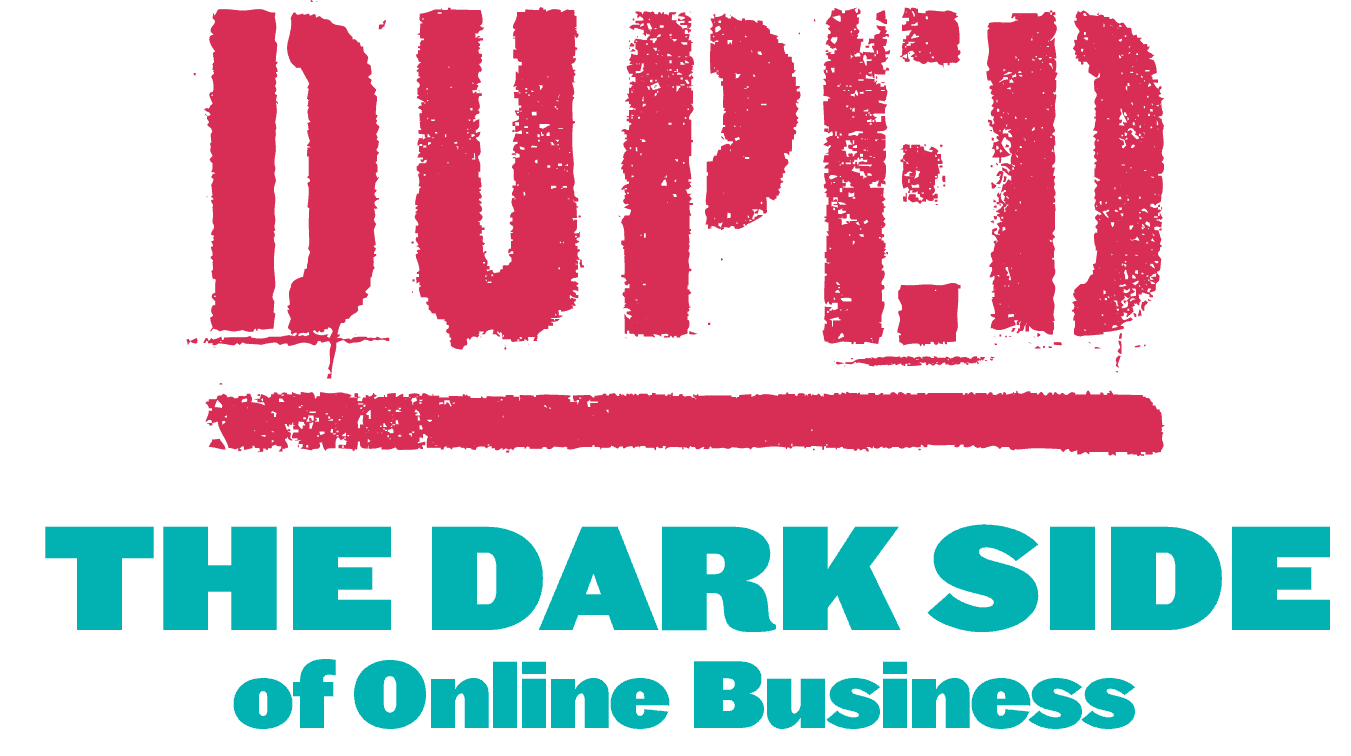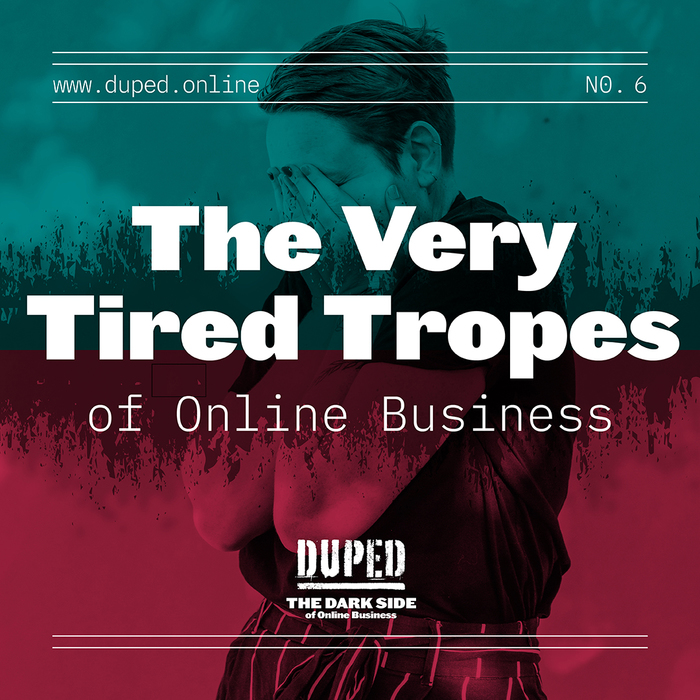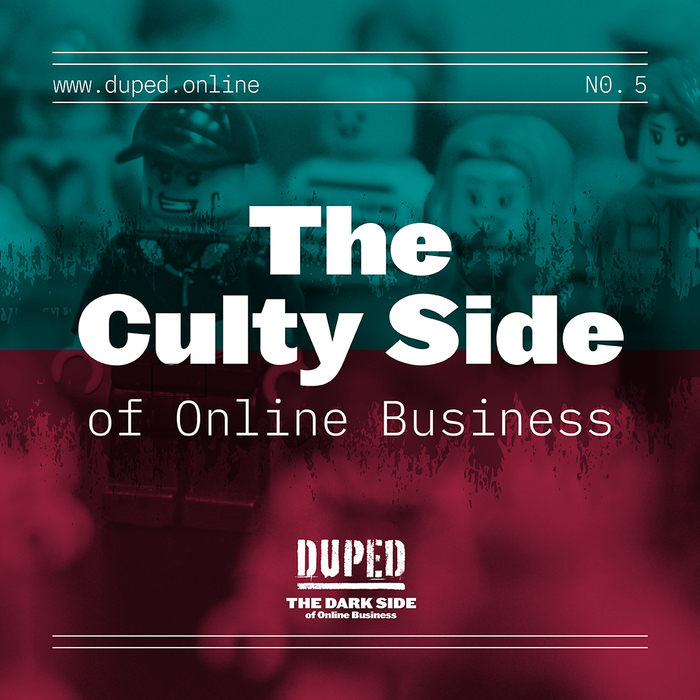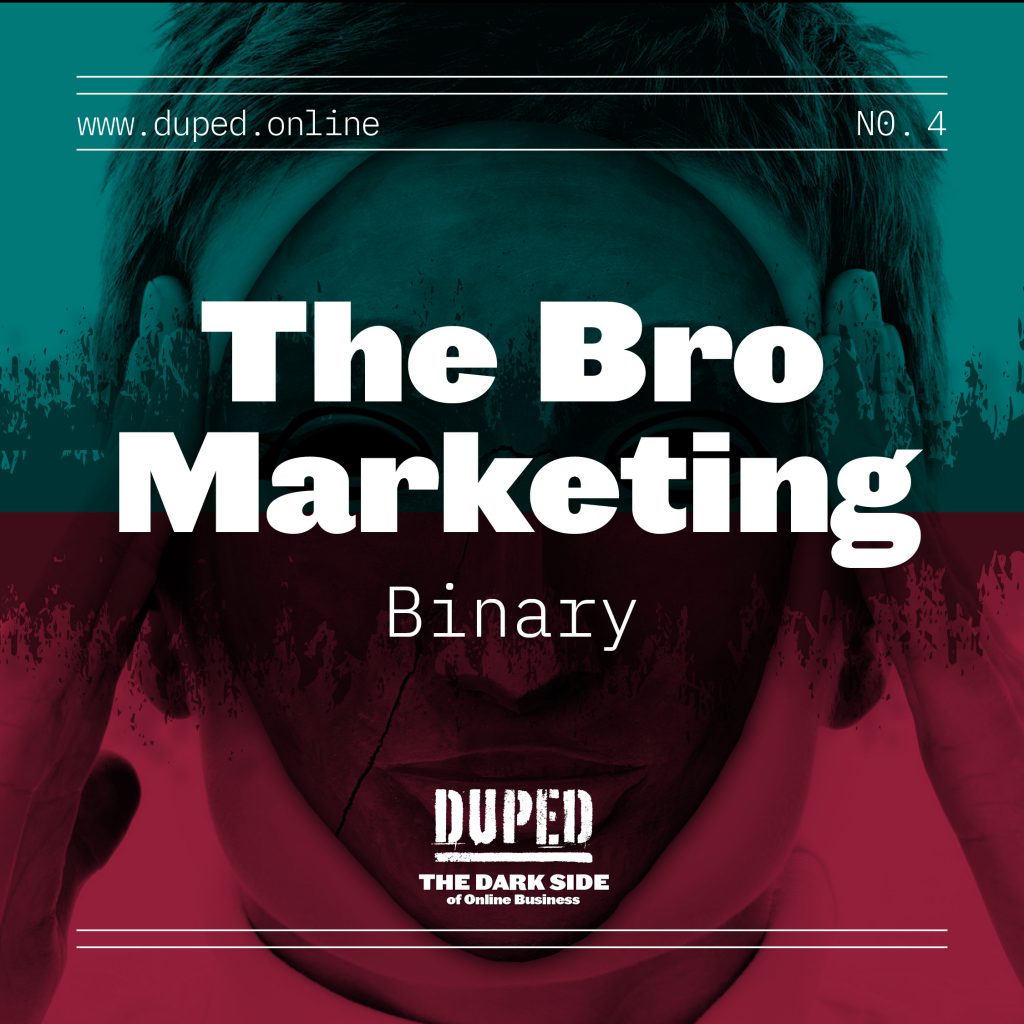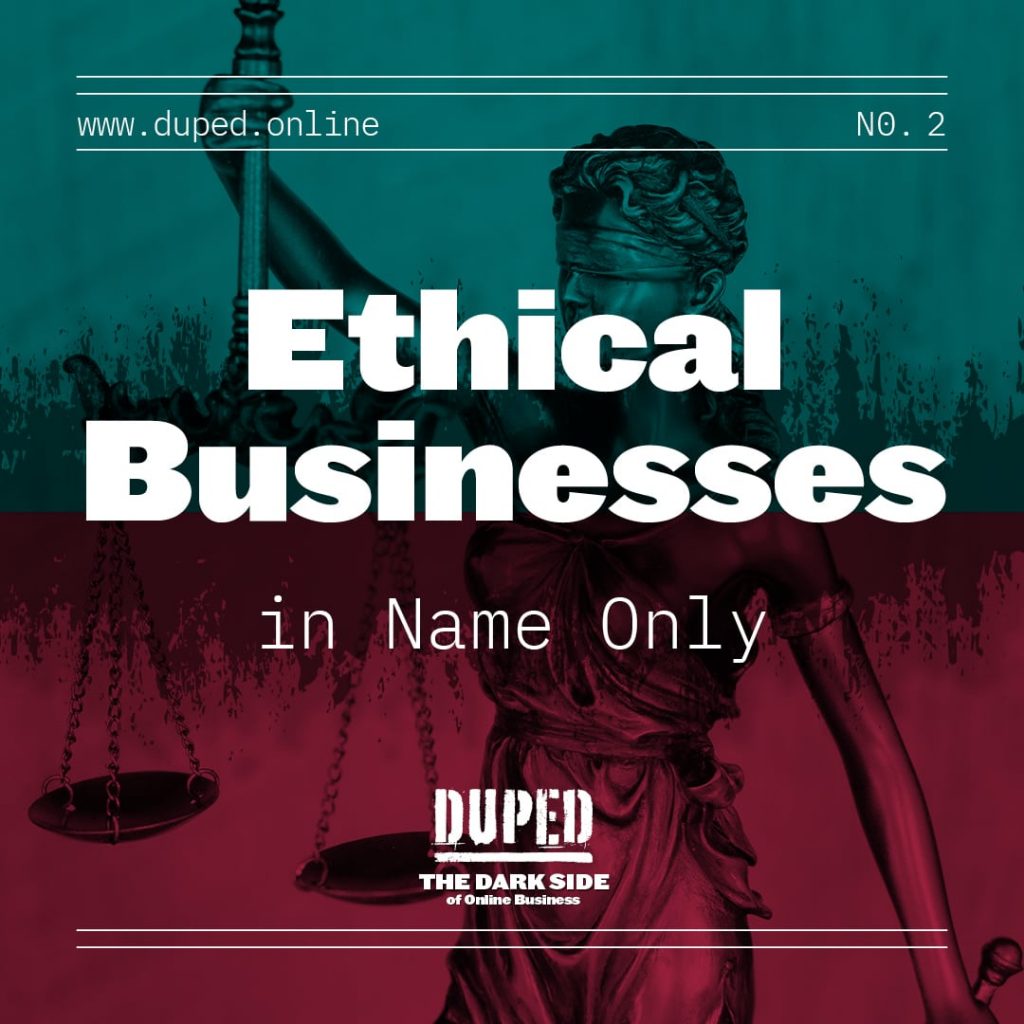
The Freedom Paradox
The promise of freedom rings loudly in online business. Time freedom, location freedom, financial freedom – it seems like everyone promises that your business will set you free. But there’s a dark side to the promise of freedom where freedom comes at a high cost and that’s what we are diving into this episode of Duped.

The Freedom Paradox
Michelle always jokes that she’s psychologically unemployable and that’s one of the reasons that she started her own business. She didn’t want anyone telling her what to do when to do it or how to do it. She wanted to be her own boss.
What we’ve noticed in the online space is that entrepreneurs wanted to be FREE from bosses and people telling them what to do. They traded their freedom from a boss to follow a celebrity entrepreneur who told them the EXACT steps to build their business.
Including what kind of business model to have, how to market, what to say in their marketing – and they traded all of this for the freedom of having the business they wanted.
In essence, these business owners traded one boss for the other. Traded the freedom they fought for from the corporate world to the celebrity entrepreneur who is promising them an easy 6-figure business.
This is the freedom paradox.
We wanted to look into the high cost of the promise of freedom, specifically, we’ll dive into the exploitation of freelancers, how getting free of clients shafts your customer and the cult of productivity that promises freedom but is rooted in something darker.
Exploitation of Freelancers & The Peril of Hiring Before You’re Ready
One of the ways that we “free” ourselves in our business is by delegating and hiring a team. I’ve noticed that in many online programs (especially those focused on scale) – hiring a team is seen as a MUST.
Now, before we dive into the dark side of hiring a team. Let me be clear – hiring and getting support can be absolutely necessary. This podcast wouldn’t be possible without the support of our podcast editor, Steve, and Maggie’s integrator Sara. We are so lucky to have people we can rely on so all we have to do is write a script, record, and share these episodes.
Having people to help in your business is necessary, but there’s also a dark side to this – where getting free relies on the exploitation of freelancers, contractors, and employees.
A while back Maggie did a podcast episode on paying your team and explored some common dark side practices in online business when it comes to paying the people who work with you.
If you’re getting your business FREE of doing the work, we have to make sure that we are not compromising the freedom of the people who are doing the work. Too many online businesses do not pay a living wage or want a unicorn who can do it all in their business.
For instance, we remember a job post for an assistant where the person wanted an excellent marketer and someone who could also walk her dog and manage her house. Now, most excellent marketers are not going to be down for picking up dog shit. These are two different jobs.
If you’re hiring, is it important to pay that person a living wage?
The final point is that sometimes businesses hire before they are ready. There’s a trope out there that if you want a seven-figure business, you’ve got to hire before you’re ready. And the place that is recommended to start with is a VA or personal assistant.
But we’ve seen people hire before they are ready, and it has a huge cost to their own financial freedom.
Some tell-tale signs you’re not ready to hire:
- You’re not paying yourself and all of your money is getting reinvested into your business.
- You’ve got more time than money.
- You don’t have systems in place that make delegating possible.
- You don’t know what you’d delegate.
- You’re not ready to step into a leadership role.
When we start an online business, there’s some bootstrapping that we absolutely need to do at first. Hiring too early impacts your financial freedom and not paying living wage impacts the financial freedom of someone else.
The Celebrity Entrepreneur Gets Free of Clients and Their Customers Get the Shaft
Now, there’s one type of delegation that happens all the time in online business that’s a bait and switch.
That’s when you buy a program because you want to work with a person only to get inside and realize the program is run by their success coaches.
A great example of how this can feel like a Bait and Switch comes from an expose from the Guardian UK about Brooke Castillo’s life coaching school.
There’s a story about a woman named Olivia (the name was changed in the article). She joined the Life Coaching School coaching certification program ($21K according to the story) and this is from the article
“But within a month, Olivia was disillusioned. The training largely consisted of material that had already been covered in Castillo’s other programs. Castillo was hardly present at all. “She’s part of the product – you’re buying her,” Olivia said. “These other coaches step in for her, but, you know, I want her, I want the real thing.”
Maggie runs an agency. Michelle was a part of a market research agency back in the day. What we know is that the person who sells a project usually doesn’t do the actual day-to-day work.
There’s a way to do this that doesn’t feel like a bait and switch. The problem is a lot of the time when the entrepreneur gets free of their client – it’s the clients who get the shaft.
Indoctrination in the Cult of Productivity
Finally, we are told if you want to create freedom in business that you need to be PRODUCTIVE!
Did you know that if you just worked hard enough, pulled yourself up by your bootstraps, you too can be financially free? (Yes, that’s sarcasm.)
Part of freeing ourselves from our business is embracing productivity – that we can do more, more efficiently in less time than ever.
The underlying message around productivity is if you’re not successful – it’s your own damn fault. You didn’t work hard enough. You didn’t hack your productivity. You could always be doing more, You’ve never done enough.
The Cult of Productivity is rooted in the protestant work ethic and the prosperity gospel. According to Britannica, “Protestant ethic, in sociological theory, the value attached to hard work, thrift, and efficiency in one’s worldly calling, which, especially in the Calvinist view, were deemed signs of an individual’s election, or eternal salvation.
German sociologist Max Weber, in The Protestant Ethic and the Spirit of Capitalism (1904–05), held that the Protestant ethic was an important factor in the economic success of Protestant groups in the early stages of European capitalism;”
Most productivity techniques are rooted in capitalism – it’s about how to get more out of your workers so your business can be more profitable.
The biggest issue to me is that success is not equally available to all. The pull yourself up by your bootstraps is only available to the white men. Productivity doesn’t take into account issues of race, gender, sexual orientation, economic class, disabilities.
The other part of this equation is the prosperity gospel.
Which according to a report in Vox by Tara Isabell Burton: “The prosperity gospel is an umbrella term for a group of ideas — popular among charismatic preachers in the evangelical tradition — that equate Christian faith with material, and particularly financial, success”
If you’re good, obedient, work hard, and follow the Christian faith, you will be blessed with my material riches.
Most of the time when we think about the prosperity gospel, we think about figures like Joel Osteen or Jim and Tammy Faye Baker.
The bottom line is that productivity is a tool that is sold as a way to create freedom in your life. But because of systemic issues that freedom doesn’t materialize and we end up giving our own freedom away in the pursuit of productivity for productivity’s sake.
How to Question the Promise of Freedom
You know at Duped that we love giving you away to think about and do something about the issues we raise. So the next time you see someone promising you time freedom, financial freedom, or just plain old freedom.
- At What Cost: Ask what the price of freedom costs someone else. Does your freedom rely on exploiting someone else? Are you building your wealth by screwing over other people?
- Don’t Hire Before You’re Ready: Hiring is seen as a way to accelerate growth, which it is, but the way hiring is talked about in the online world traps people into bad business practices. If you can’t afford to hire and compensate someone appropriately, you’re not ready.
- Pay a Living Wage: This should be the absolute minimum, and you should add on top of that for your contractors. Do you want your people struggling and exploited?
- Know You You’re Really Working With: Ask who you’ll be working with before buying a program. Understand how coaching and support are delivered, what the qualifications of those people are (are they experienced business owners?), and if you can, how they’re compensated. (Snoop job postings if you can!)
- Success is Not Equally Available: Remember that not everyone has equal access to financial freedom and success. The idea that we can all pull ourselves up, and this rugged individualism and prosperity gospel is rooted in systems of oppression, especially white supremacy, patriarchy, and capitalism, as well as Christian hegemony.
Links for this Episode:
- Paying Your Team Episode on the BS-Free Service Business Show
- Guardian UK Article About Brooke Castillo’s Life Coaching School
- U.S. Living Wage Data
- Living Wage Canada
- Prosperity Gospel Episode on the BS-Free Service Business Podcast
- Protestant Ethic Definition
- Article: The Prosperity Gospel, Explained
- Jon Stewart The Problem with Freedom
- Dynamic Delegation with Bekka Prideaux
- Bait and Switch Episode of Duped
- Brittany Berger – Work Brighter
- Becca Rich
- Conspirituality Podcast
- An Open Letter to Elena Brower
- A Little Bit Culty
- Maggie’s Circle of Indoctrination post
Join the

Patreon

for only $7/month and get a
monthly bonus episode,
behind-the-scenes content
and more.
Recent Episodes of Duped
- « Previous
- 1
- …
- 3
- 4
- 5
